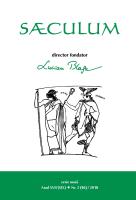DISCURSUL IDEOLOGIC ÎNTRE REFERENȚIAL ŞI PERLOCUȚIONAR
Ideological discourse between referential and perlocutionary
Author(s): Daniela DuncaSubject(s): Philosophy, Social Sciences, Communication studies, Rhetoric
Published by: Editura Universitatii LUCIAN BLAGA din Sibiu
Keywords: ideological discourse; power; legitimacy; referential function; perlocutionary force;
Summary/Abstract: Language takes part in legitimizing modern power. In this sense, the ideological discourse actualizes the language functions identified by Jakobson. Ideology is not only incentive, because power must and justified. For this reason, its discourse must be equally referential; i.e. it must explain, establish or reject, using historical facts or statistical data. However, ideological discourse does not reach the characteristics of scientific discourse (objectivity, consistency, noncontradiction) because it cannot query the value of its truth. Its main value is not given by the truth, but by the perlocutionary force of its text. Scientific discourse is not interested in the effects on the recipient, whereas ideological discourse aims mainly at the legitimation of power before the auditor. As a result, ideological discourse is based on the relationship between text, the person who pronounces it, and the „locus” allowing its exposure. Explicit support of power is not enough for it to become legitimate. It is also necessary to recognize it more or less silently, i.e. it becomes dominant, but it should also be recognized. This is the essential condition which gives force to an ideological discourse.
Journal: SAECULUM
- Issue Year: 46/2018
- Issue No: 2
- Page Range: 194-199
- Page Count: 6
- Language: Romanian
- Content File-PDF

